2022 Orientation: Government/Policy
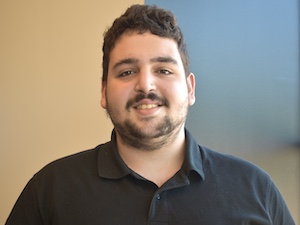 Kerim Bali | Office of Councilmember Mark Conway
Kerim Bali | Office of Councilmember Mark Conway
The CIIP orientation was truly a great experience for so many reasons. First and most importantly, it was great that all fifty of us (and the CSC staff) got to interact with each other and I got to know almost every person. I loved having a peer mentor group, and I also loved having activities where I got to do things with new people!
While all activities were enjoyable in their own way, I do want to list a few favorites and highlights. On Monday, I really enjoyed listening to the History of Baltimore presentation. It was also very beneficial to get that context early on, since those topics came up in many of the events throughout the week. On Tuesday, I was happy to have time for a breakout session about our goal sheets and discuss more in-depth how our day to day schedules and tasks would look like. The scavenger hunt had so many highlights that it would be difficult to list, though winning was definitely on the list! I also loved the interactive theater workshop and our “make something representing Baltimore” task on Thursday.
I will say that with presentations such as “Getting Around Baltimore” or “Fun Things to Do”, I wish I had gotten this information when I came to Hopkins! After three years here, I would like to think that I’m somewhat knowledgeable about Baltimore transportation or restaurants and fun activities, etc., but I would have loved having this information when I first came here. So I think that the CSC should take over the Hopkins orientation.
Overall, the orientation week was not only such a fun time, but also led to some very serious conversations and important topics. From discussing racial segregation and the white L and the black butterfly, to examining Hopkins’ and our role in our community, it was definitely a thought provoking week.
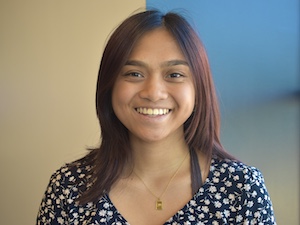 Mikayla Chua | Office of Councilmember James Torrence
Mikayla Chua | Office of Councilmember James Torrence
Orientation was challenging in that I had the chance to actualize concepts and theories from presentations through practice and application. It took just attending presentations or completing learning modules a step further. In order to instill the lessons learned from these presentations, it is a different ballpark having to reflect and discuss in a group discussion. For instance, during a workshop, I was conscious of how my identity differed from the community I was serving and made me feel out of place, and so I needed to be aware of how my identity interacts with my placement. However, when Laís asked me to come up with concrete solutions as to how to approach my fear and how to be aware of my privilege in practice, I found it difficult to articulate at first. I also found that it was okay to not know the answer as to how yet and to allow myself the room for a learning curve at my placement. Being able to reflect by voicing my opinion in a public setting forced me to mentally challenge myself with the discomfort.
One of my favorite parts of the orientation was the Baltimore scavenger hunt. I think that every Hopkins student should experience. It is a concrete exercise that exposes students to understand how to utilize public transit while also understanding its shortcomings in Baltimore. It also shows that there is more to Baltimore than the Hopkins Bubble, allowing for more familiarity and understanding of the surrounding community. I enjoyed that I got to experience this new challenge with a community of people, new and old friends who share similar values but diverse backgrounds and experience. Everyone brought something different to the table, which made the room a safe, learning space to grow. After orientation, I feel as prepared and equipped as one can be to start my placement.
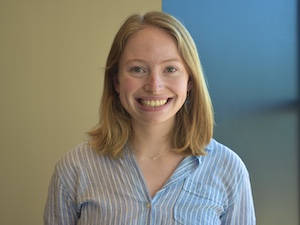 Sigrid Edson | Mayor’s Office of Immigrant Affairs
Sigrid Edson | Mayor’s Office of Immigrant Affairs
Going into orientation, especially as a peer mentor who had already had days of preparation work ahead of time, I was worried I would feel drained and unable to put in the energy required to get something valuable out of the experience. However, although the week was tiring, I found orientation to be one of the most energizing and empowering weeks of my life. Getting to know my group and other members of the cohort reminded me that I thrive in a leadership position, bonding with the other peer mentors showed me the gratification of building new relationships, and experiencing all the workshops and presentations as a participant recentered my thoughts about goals, identity, history, and struggle, as well as opening me up to new ideas. Every day, I went home tired but genuinely happy and excited for the next day, and with lots to reflect on.
I had a lot of memorable conversations over the week, but the one that will stick with me was with the randomized group I had lunch with on Tuesday. We had already discovered during an icebreaker activity that many of us identified with not really knowing what we wanted to do after college, and we dug deeper into that idea as we ate. Then, one person brought up that they had recently come across a term to describe people like us: multipotentialite. Hearing this named (with a positive connotation) made something click for me and made me feel seen for and proud of something I always felt was a bad thing, especially at a school like Hopkins. Leaning into the fact that I have many roads of possibility ahead of me helps frame my indecision as a strength, and puts into focus one of the reasons why I’m doing CIIP and why I’m at my particular placement.
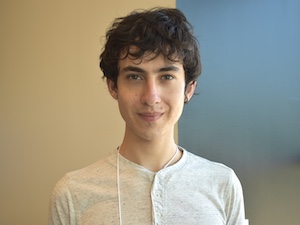 Carlos Gamboa | Office of Councilmember Zeke Cohen
Carlos Gamboa | Office of Councilmember Zeke Cohen
Thirty minutes before orientation started, I was sitting in the St. Paul THB, hunched over a crumb-filled paper bag and doom-scrolling on my phone. I had been in the same position for the last half-hour, sifting through my friends’ summer vacation posts and sipping on my lukewarm coffee. I glanced at the time furtively every few minutes, trying not to think about the week ahead. I only knew four or five of my fellow interns in any capacity at all, and I didn’t know what to expect from orientation. I never like to admit when I am nervous, not even to myself, but I wasn’t fooling anyone. I tried to calm myself down, but I could tell I was anxious from the muted taste of my breakfast, the stiffness of my shoulders, the thunderous ticking of the clock. The EDM music blaring in the store did little to soothe my nerves. I took another sip of coffee, then a deep breath. I glanced at the time: eight-forty. I dreaded walking to orientation alone, but I had no choice.
As I stood up, though, I heard a pair of familiar voices by the exit, joking quietly about whether I recognized them or not. Of course, I did: it was two classmates who were also headed to orientation. I immediately made my way over to them and starting chatting, and we decided to walk over together. I didn’t show it, but I was overjoyed: I knew everything would turn out for the better now that I wasn’t alone.
During orientation week, I discovered time and time again the value of companionship and cooperation. On the first day, I leaned on the friends I knew from last year to collaborate on group activities, keep each other company, and vent about frustrating travel complications. This initially small group quickly expanded in the following days. I bonded with my peer mentor group during the scavenger hunt around Baltimore, for which we had to cooperate closely to crack the clues, navigate public transportation, and complete challenges, such as creating a poem at Poe’s grave and a performance at the YNOT lot. I also made new friends outside of my peer mentor group, either through randomly assigned partners for group activities, like mirroring a classmate’s dance during the Interactive Theatre Workshop, or by starting conversations on a whim. We bonded not only through discovering our similarities, but by appreciating our differences: our varying experiences, identities, and backgrounds. By combining our distinct skills and perspectives, we explored nuanced answers to reflection questions and found ingenious solutions to challenges.
By the closing reflection activity on Friday, a room full of unfamiliar faces had transformed into a community of friends and mentors. As of now, I am yet to start my placement at City Hall, but the first-day jitters have already faded. Now that I have such a compassionate, resourceful, and accepting group as my support system, I know that I am ready for any challenge the summer might throw my way.
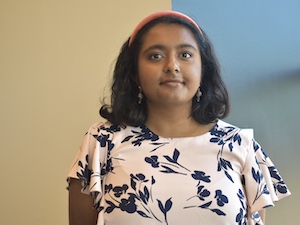 Diksha Iyer | Out for Justice
Diksha Iyer | Out for Justice
Orientation was particularly challenging because not only was it very intensive, but it made me uncomfortable (in a way that forced me to reflect on my identities). For the first time in my life, I was encouraged to fully unpack the origin and impact of my privileges, rather than just acknowledge that they exist. Previously, I thought that I was well prepared to enter the Baltimore communities and meaningfully interact with the individuals that I meet. This confidence mainly originated from taking courses at JHU that examined the role of public health in addressing racial inequities. However, I now realize that those courses just represented the first step of my journey. I did not fully understand the historical context of Baltimore, the diverse identities seen within its neighborhoods, or the specific destructive interactions Hopkins has had recently with Baltimore, for example. I also did not know how to constructively interact with the Baltimore communities within the context of that knowledge but thought that I did. With that ignorance, I felt confident to work with the staff at Out for Justice. Now, I feel more unsure about whether I will stumble and make harmful mistakes. Though I know I will make mistakes (and should make them, so I can learn) regardless of how much I know or how much I study, it is still a scary outcome. Orientation has shown me how vulnerable I need to be to recognize my impact on the community I will be working with through Out for Justice. Each individual has their own lived experiences, and I need to work within that context to connect with them.
This lesson was also brought up in an activity I particularly enjoyed with the Theater Action Group (TAG). It helped me understand how the categories for various identities and privileges that we use to “classify” individuals might not be the ones that they feel they align to. The personal history of an individual has a greater impact on the way that they perceive themself, thus providing more nuance. I also loved the scavenger hunt we took around Baltimore since it gave me the initiative, tools, and confidence to explore Baltimore. Throughout my freshman year, I stayed relatively stuck within the Hopkins Bubble, and only really accessed places that were connected by the JHMI or the Blue Jay Shuttle (which limited my explorations to areas around the White L). I have always wanted to explore the three arts districts in Baltimore, and truly appreciate the street murals around the city, and was not able to do that during my freshman year. This scavenger hunt encouraged me to do that but also allowed me to bond with the members of my peer mentor group! We had several very interesting conversations about the historical significance of the places we visited and also identified places that we wanted to visit together throughout the summer. It was a really eye-opening experience and definitely increased my skill level with taking public transportation (which was greatly appreciated).
On a side note, I also loved the fidget toys that we got – I’m finding new shapes to make every day!
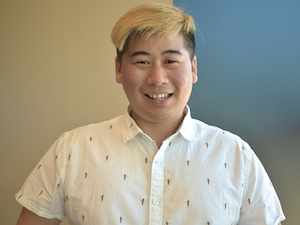 Frank Meng | BCPS Engagement Department
Frank Meng | BCPS Engagement Department
What challenged you about orientation? What aspects did you particularly enjoy? Why?
It is indeed an eventful week full of informative sessions, reflective discussions, and fun conversations with friends, peer mentors, and other supporting staff. The packed schedule is tiring at times, but every day (after my morning coffee), I wake up looking forward to getting to know my peers better, learning about the Baltimore communities, and reflecting on my privileges.
One of the biggest challenges for me is shifting my perspective from a Hopkins student to a community member that aims to serve Baltimore City. As a transplant, this is my first summer in Baltimore. With the Hopkins bubble, I did not fully explore the city’s charm, let alone get on a purple line circulator to immerse myself as a Baltimorean, engaging with the people and the vibrant communities. However, the scavenger hunt led me to the metro and light rail for the first time. Seeing the shotgun tower, the historical B&O Railroad Museum and the Lexington Market are genuinely eye-opening. Next semester, I definitely need to spare more time to probe the hidden gems.
Orientation week gives us a buffer before going into our community partners. “Privilege” is probably the single most mentioned word during our orientation. It is simultaneously reflective, reflexive, and uneasy. I even give a session talking about how to recognize our hidden and invisible privilege, but that does not put me in a position not to be reflective. Precisely, during my preparation and presentation, I learned much about how to articulate my privilege better and create a critical conversation to raise hard questions. This leads to the aspect I enjoy the most—Group Reflection. I like how we hold reflections with both our peer mentor group and randomized group, so we get to know our peers and their stories on a personal level.
I LOVE our all-female alumnae panel and peer mentors. It is empowering.
This week is the start of our transformative experiences, and this week per se, is transformative. Knowing the positionality of Hopkins affiliation is impactful (both positive and negative), adopting an asset-based approach to the communities, and stepping out my first step of reflecting on my privileges and how to leverage that for just.
Be confused, be venerable, be ready to change, to anti-cultural.
